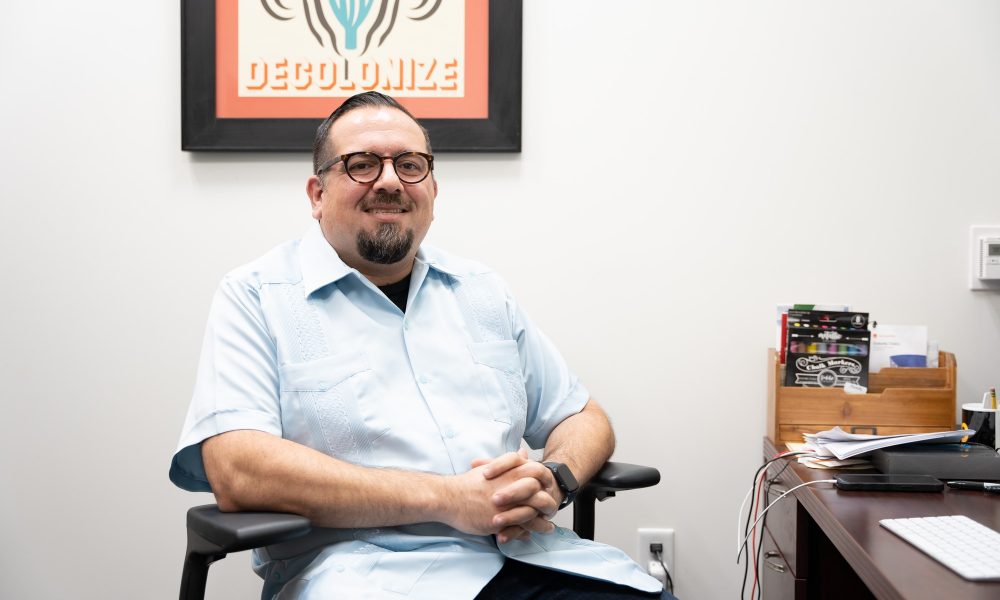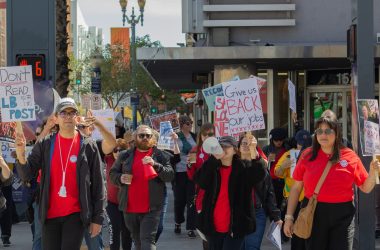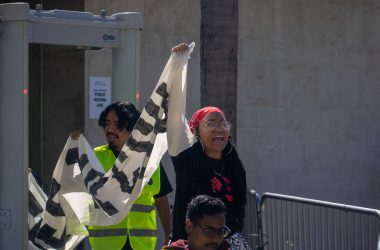Yousef Baker is the co-director of the Middle East Studies program at Long Beach State and an associate international studies professor according to his biography from the College of Liberal Arts.
His work is centered on the Middle East and North Africa and he has recently been working on “issues of anti-Muslim racism and their connection to larger national and global issues,” according to his biography.
He focuses on how this intersection shapes politics in the U.S. as well as politics around the world.
Q. What has been your experience watching the conflict unfold in Israel and Palestine?
A. I have a profound sadness and despair… I have a certain sense of hopelessness and helplessness because I don’t think that the political elites in this country or Israel are really responsible [trustworthy]. And I think they’re driven by deep hate and racial animus, and I am profoundly frustrated that we really, in the United States, haven’t moved beyond the same kind of racial logic that was around during the war on terror, and a lot of that is being recycled again.
I also feel inspired by the number of people across the world who have come out and are able to see beyond what governments say, beyond what I call “state logic,” and to kind of develop their own critical analysis of the situation. So that’s been inspiring…
…there’s a sense of despair, but I don’t feel defeated in my despair.
Q. What about your experience watching the protests and other solidarity efforts happen on campus as a response?
A. I think there’s an attempt to treat this issue like it’s unique and not like any other issue, not like any other thing that happened across the world, not like anything else that happens even in the United States. Somehow this issue needs to be unique and different, and I don’t believe that. This issue is like any other issue when a government [Israel] oversteps its lines and goes against international law.
Q. What was going through your head when you first heard about the Hamas attack in Israel?
A. I remember that I woke up to the news. It sent me into a spiral. My day changed. I forgot what I was supposed to do. I had a hard time hearing my kids or focusing on what my partner was telling me. Colors dissipated. It was a surreal feeling, but one that I’ve had before.
I was, and continue to be, in anguish. In the immediate aftermath of Hamas’ incursion, I was trying to make sense of my feelings and thoughts.
Seeing the initial pictures of fear, sorrow and confusion of ordinary people who lost loved ones or whose loved ones were missing was overwhelming. I’m always overwhelmed by pictures of human suffering. I felt overwhelmed because as someone who has tracked and observed politics in the region, I could already see what was about to happen. Grief was going to be used by powerful people to produce more grief.
I was very afraid, given the Israeli state’s record of complete and utter disregard for Palestinian life, especially after 2005 when the use of live ammunition against protestors became commonplace. I was terrified by what the Israeli government was about to do. The statements coming from the Israeli military and executive leadership were an open call for the killing of all Gazans as they described them as “human animals.”
I felt a need to drop everything and go study. That is my usual response to wars and violence. Study and analysis give me a sense of control over situations I have little control over.
Q. Have you been able to freely speak on campus about your perspective on the conflict?
A. So there’s an attempt to silence any conversation around this conflict, unfortunately, and that silencing is happening by gross misrepresentation of what is actually going on … And a lot of things are happening behind closed doors where faculty are threatened for speaking or are being questioned for organizing events that they would normally do for anything else.
Q. Can you give me an example of the harmful language that you said is being used by both Democrats and Republicans to describe this conflict?
A. This is colonial violence, the structure in Israel and Palestine is a colonial structure. And so that is the problem. It’s not the question of between Jews and Muslims, or even Palestinians and Jews being able to live together or not. The question is, the Israeli state is practicing settler-colonialism and engaging in colonial violence, which is part of the reason why there’s so much support across the world for Palestine, especially coming out of places that have been colonized like South Africa, Ireland…
The problem, however, is that both Republicans and Democrats talk about this as a civilizational fight between a modern, enlightened, legal, law and order-based state and a pre-modern, barbaric, savage, terrorist other. Thus, the violence of Israel is always seen as calculated, rational and in some ways, promoting humanity and life, and whatever comes out of Palestine, whether it’s violence or non-violence, is always seen as being exclusionary, being pre-modern, being irrational and outside of law and order.
Q. Have you seen this rhetoric used in other situations?
A. For me… this is very similar to the way that the US government, and its policing entities across the nation, spoke about the deaths of Black men and Black folks in general. Where they would say that, especially Black men, are violent, they are prone to criminality, before they do anything…
That same thing is happening to Palestinians. So that before they are being killed, the Minister of Defense for Israel comes out and says, Gaza is full of “human animals,” and we will act accordingly. Right there he’s making the distinction that these people are different than these people [Palestinians and Israelis] and thus they could be susceptible to death.
Q. What is the effect of this rhetoric?
A. Part of what happens in that moment is that you cannot grieve for these people. To grieve for them is to somehow enter into a political conversation. And so on this campus, unfortunately, to speak about what is happening and to talk about what is going on, or to even grieve for the people, is seen as taking a position in support of Hamas or creating some kind of inhospitable environments for people, and that to me, is offensive.
Q. How do you feel about the United States’ involvement in this conflict?
A. What’s going on in Israel is that it has the green light to do whatever it wants from the United States. So the other point here, I think the major kind of elephant in the room is, that the United States is an instigator of violence, as opposed to a party that gets interested in ameliorating or stopping the violence happening.
Q. I’ve heard that one of the first steps in winning a war is to dehumanize the other side and paint them as animals. Is that happening here?
A. There’s no way that you can get people to look at each other as people and kill each other, just like that. You have to persuade them, that the other side is not humans, they’re animals…But otherwise, if you’re Jewish with very slight exceptions, you are conscripted to fight, you have to serve. And so then the state has to convince you that what you’re fighting is not only existential, but that also the other side is qualitatively different from you, and thus it deserves the type of violence that you’re going to inflict on them.
Q. When criticizing the State of Israel and its actions as a government are you criticizing Jewish people as a whole?
A. The state has nothing to do with Jews, Jewishness, Judaism, Jewish culture or Jewish history. The state is the state. Just like the United States government has nothing to do with my neighbors… Unfortunately, the way that this has been misrepresented is somehow when the government of Israel does something, that they are speaking to, on behalf of and for all Jewish peoples, thus any critique of the State of Israel is a critique of Jewish people at the roots.
…antisemitism and anti-Jewish racism have nothing to do with the critique of the State of Israel because I could critique the State of Israel just like the governments of Saudi Arabia, Iran, the U.S., China and Russia. It has nothing to do with how I feel about the people living there.
Q. Do you agree with the word genocide being used to describe what’s happening in Gaza?
A. The policy of the State of Israel is to have the maximum amount of land with the least amount of Palestinians. So it’s always been figuring out different ways of moving Palestinians to different places, cornering them off to expand the State of Israel, whether it’s in the West Bank, or in Gaza.
So their strategy with Gaza has been to… put them under siege and just control that population. Whereas in the West Bank, their project has been to slowly take over more and more land…So now, we have an increase in the number of settlers and then all of the infrastructure that connects the settlers to themselves and the State of Israel. So in that sense, the long policy of the state has been the movement of Palestinians out, the erasure of their memory, and to make life more and more difficult for Palestinians.
What do you call what is happening now in Gaza…it really doesn’t matter to me. I think what is important is they are trying to move everybody out and they are trying to destroy major parts, if not all of the Strip.
Q. Do you think that peace can be achieved? What would you consider a fair peace for both sides?
A. Jews have lived in historic Palestine for a long time. And then there were also other Jewish people who came to Palestine after the second World War, and there’s absolutely nothing wrong with them. What is wrong is when you say I’m not coming here as an immigrant or refugee, but I’m coming here as a settler attempting to create a state in which I am the priority, and I am the state’s people and those people who lived here are no longer the state’s people. They are outsiders.
So for me, an actual just peace is one that moves us beyond nationalism, where Palestinians and Jews and others… are able to live in a land where there can be democracy and secularism, and it’s not governed by a state that derives it’s legitimacy from one nation or another. Where multiple people live all at the same time.
…I think we have to learn and move beyond nationalism, of being able to create states and governments whose legitimacy is based on some notion of one nation and that you have land that only belongs to that group of people. That just doesn’t work on Earth…




